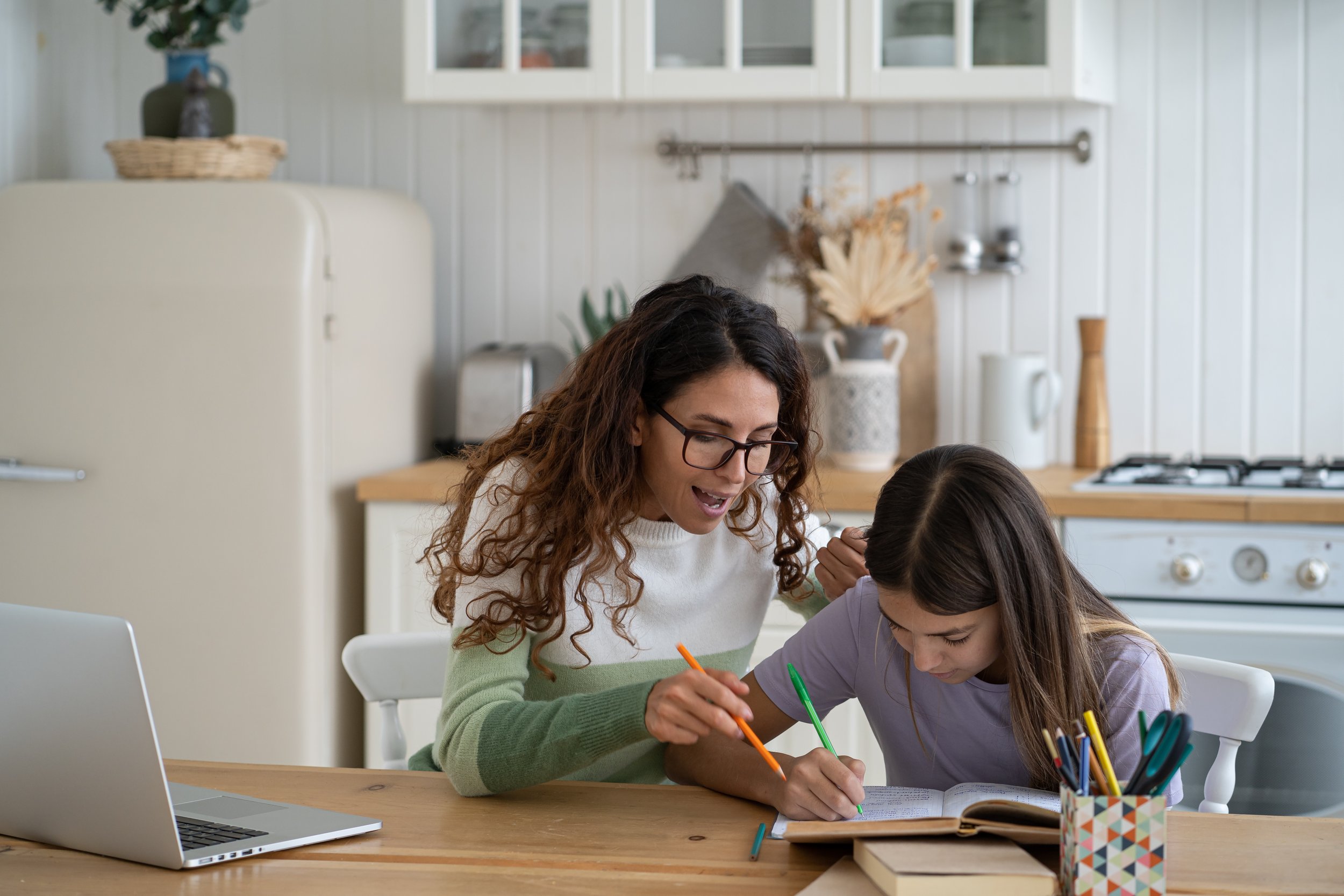The Homeschooler’s Bill of Rights
There is no single right way to homeschool. What works for your family is right for your family—and if that right thing changes from year to year (or month to month), that’s okay. These homeschoolers are life learning on their own terms, and you can, too.
You have the right to outsource everything.
There are a lot of things I love about homeschooling. I love how relaxed our mornings are. I love how my daughter gets to focus on what she loves. (Right now it’s chemistry and soccer.) I love how much I’ve learned myself. But I don’t actually love teaching my teenage daughter—and now, I don’t. Hailey takes classes online and at a nearby college, through dual enrollment. Sometimes we talk about what she’s learning, but I’m not her teacher or even her co-learner. I’m just her mom.
I was actually excited about homeschooling when we decided to pull Hailey out of school during her first year of 6th grade. (Cue the usual stories of mean girls, bullying, and unhelpful school administration.) That first year was really terrible, though. Our kitchen table felt like a battleground. I wasn’t confident in my own knowledge — so many countries had rearranged themselves since I learned geography, and apparently you really don’t use pre-algebra that often in real life because I was always getting confused trying to explain problems.
A friend recommended our state’s cyber academy, which we joined in 7th grade. They sent us big boxes with all the books and supplies Hailey would need for her classes. Technically, Hailey was enrolled in the public school system, but for all intents and purposes, she was a homeschooler, logging into her online classes from home. Even though the workload was a little heavy and we opted not to continue with that program, 7th grade was a huge improvement over 6th grade. We really found our stride in 8th grade, signing up for some classes online and taking some classes through a local homeschool group. Obviously I’m around if Hailey needs help or has a question, but I’m not her primary teacher for anything, and for us, it’s much better that way.
Someone at a homeschool group asked me if we considered ourselves homeschoolers even though Hailey doesn’t do any subjects with just me, but I think we’re definitely homeschoolers. In my opinion, homeschooling is about figuring out what your kid needs and finding a way to make it happen for them. That’s exactly what I’ve done for Hailey—and there’s no way I would have been able to discover that without homeschooling. —Jamie C.*
You have the right to change your mind.
Once upon a time, I was the most gung-ho homeschooler you could hope to meet. I knew from the day my oldest son was born that I wanted to homeschool. I help found a secular homeschool co-op in our town and served on the board in various roles for almost a decade. And then, last year, I sent my kids back to school. My oldest was in 8th grade, and his brothers were in 5th and 3rd grade.
There were so many things I liked about homeschooling. I loved getting to spend the day with my kids. I loved learning with them. I liked the slowed-down pace of our everyday life, especially compared to the hectic schedules our school friends were dealing with. But I missed having a “real job” and spending time with other grown-ups. I found it hard to find space to mentally and emotionally recharge. I found it harder and harder to walk that line between being my kids’ teacher and their parent. And so, I changed my mind.
I miss homeschooling, but sending the boys back to school has been the right decision for us. They love their teachers, their classes, their friends. I love my job. I feel like homeschooling laid a great foundation for our family—we still learn together, we still make family a priority, it just comes together in a different way now. I like to think that our life now is just another phase of homeschooling since we’re making the learning choices that work best for us as a family. —Alison H.*
You have the right to use those workbooks.
I have a confession to make: We use workbooks. And I really like them.
When we first started homeschooling and went to our first park day, there was a group of moms making fun of workbook-users. They weren’t doing it to be mean — they definitely didn’t know that I had a little stash of Scott Foresman workbooks in my tote bag. Later, I would get to know these moms. I would understand that when they made fun of workbooks, they were making fun of the school system that had let their kids down. Their experiences with the school system had been bad, and workbooks had been a tangible piece of that experience. Once they got their kids away from fill-in-the-blanks or circle-true-or-false, those kids had bloomed.
But that first day, when I was a brand-new homeschool mom with no idea what I was doing, those comments about workbooks were like a slap in the face. Was I going to give my kids a terrible learning experience? Were they going to be stuck in a little intellectual box because they answered some multiple choice questions every couple of days? Why had I even thought workbooks could ever possibly be a good idea?
So I hid those workbooks in my file cabinet, and I decided that we would do something else. We tried unschooling. We tried narrations, the Charlotte Mason way. We tried Waldorf. But nothing felt like the perfect fit — until I pulled out those workbooks again one rainy day, and they just clicked for us. My daughter liked filling in the blanks and circling the letters. I liked being able to see her progress on the page. We liked workbooks. And so we kept on using them. We’re still using them — not exclusively and not every day, but workbooks are a significant piece of how we learn.
Sometimes other moms still make snide comments about workbook users. Often, I just keep quiet. Every once in a while, though, I’ll say, “We use workbooks.” Not because I want to put those moms in their place but because there are always new homeschoolers at park day, and I think it’s important to recognize that homeschooling can happen lots of different ways. Including with workbooks. —Amanda P.*
You have the right to not use a curriculum.
Every summer, all the homeschool groups and forums I belong to start buzzing about curriculum. What are you going to use, what’s the best program for language arts or math or music? Where are you going to buy it? It’s a conversation that I always feel a little left out of because our family doesn’t use curriculum.
We’re unschoolers — even though I know some unschoolers who use curriculum (usually in a relaxed, child-led way but not always), we don’t use it at all. I think most homeschoolers understand how unschooling works. I feel like I’m always explaining to non-homeschoolers that yes, my kids choose what they want to do all day, and no, we don’t do any sit-down lessons unless they want to learn something specific and ask for them, but yes, my kids can read and write and do math. Homeschoolers — even more traditional ones—understand what unschooling is about, so no one ever seems to look askance at us because we’re living curriculum-free. But the times when everyone else starts obsessing over curriculum are the times when I realize that our choice to unschool is still pretty unusual.
I don’t worry that my kids won’t learn — every time they have been motivated to know something, they’ve been able to do it with no problem. My daughter mastered basic math skills saving up money for a new laptop, and now she can figure out sales tax in her head faster than I can. My son wanted to learn Spanish because one of his Minecraft server friends is bilingual. We used a free program through the library, and he’s learned enough to pepper his online conversation with Spanish words and phrases. They both learned to read because they played a lot of video games and I wasn’t always available to read the screens to them, and now they both read for fun, too.
I know some unschoolers are pretty vocally anti-curriculum, but I’m not. What works for people works for them. No curriculum works for us. And while it does sometimes make me feel like the odd mom out at our homeschool group, I look at how my kids are learning, and I know I’ve made the right decision for our family. —Lora V.*
You have the right to not push college.
My daughter is a homeschool graduate. She’s about to turn 26, and she didn’t go to college. If you’re a homeschooler, you know that people love to ask “But how will she get into college?” I actually had a lot of answers for that. When Josie was in elementary school, I’d tell people about that homeschool family whose kids had all ended up in Ivy League schools. When she was in middle school, I’d talk about the homeschool advantage — how homeschoolers actually tend to do better on standardized tests and in college classes that kids in traditional schools. By the time Josie was in high school, I could talk about transcripts and SATs and college visits with the authority of any parent of a college-bound kid. Only, as it turned out, Josie wasn’t that interested in going to college. She had gotten interested in photography and slowly built up a photography business during high school, taking senior pictures for the school kids in our neighborhood, at homeschool proms, even at a couple of weddings.
“I’m going to take a gap year and do an apprenticeship with a good wedding photographer,” she told me her senior year.
And, as it turned out, her business kept growing, and she decided she wasn’t that interested in college after all.
At first I felt apologetic. I felt like I had to make excuses about why my bright, homeschooled daughter wasn’t off to some great college like her friends. Then I realized that Josie was doing exactly what our homeschool life had taught her to do: going after what she wanted without getting stuck thinking that there was one right way to get there. I’m so proud of her. There are still times where part of me wishes that she had chosen college, but then I have to remind myself that this wish is about me, it’s about showing the rest of the world that homeschooling was the right decision for us. That I did right by my daughter educationally speaking. Josie doesn’t need that. She’s not wasting any time wondering whether she had a well-rounded education. She’s doing what she loves, and I love that. —Corey H.*
You have the right to give your child a bad grade.
My son has a C in 11th grade English on his transcript.
As homeschoolers, we talk a lot about how grades don’t matter, but when your child starts high school and you have to start thinking about transcripts, you kind of have to think about grades. And they do matter, at least a little, because your transcript is a record of your homeschooler’s academic experiences. If you’re a homeschooler, it’s easy to see that transcript as a measure of your own personal success — or failure.
I assumed that my son’s transcript would be full of good grades. Isn’t that the point of homeschooling? We wouldn’t have to speed up or slow down to accommodate anyone but ourselves. We could play to my son’s strengths. He could pick the classes he wanted to take. There was no way his transcript would have anything but As on it, right?
English has never been my son’s favorite subject, but he’s always done the work. That changed during his junior year — he had four novels on his reading list, and he always had a reason he hadn’t kept up with his reading. Our “book discussions” were basically just him promising that he’d catch up next week. By the time February rolled around, he’d only made it halfway through one of his assigned books. He ended up writing a decent paper on that one book, which he did finally finish, but the comparing and contrasting authors I’d planned never happened.
People talk about mom-made transcripts, and this was the first time I really understood how tempting it is to give your child a good grade no matter what his actual performance was. I have to be honest: There was a big part of me that wanted to just give him a B and move on, trusting that he’d learned to work harder next time. But I knew that wasn’t fair to all those other moms out there making homemade transcripts. We all live under the shadow of colleges and universities thinking that we’ve inflated our children’s grades — if I gave my son a better grade than he earned, I’d be making it that much harder for every transcript-making mom. But more importantly, my son hadn’t earned a better grade. He’d had the time and ability to complete his work. He’d had the freedom to decide what that work would be. And he’d chosen not to do it, he’d chosen time with his friends and playing video games and soccer practice over English. That was his choice to make, but it meant he’d earned a C.
I worried that he would be upset, but my son didn’t seem surprised at all. He knew he hadn’t done his best work or even good work. And in his senior English class, he earned an A. He might not have learned everything I thought he should have learned from 11th grade English, but maybe he learned something even more important. —Allyson E.*
* last names omitted for online publication
















When homeschool parents get competitive, it’s often a sign that they’re feeling insecure about their own homeschools. So be nice when you can, but don’t get drawn into a my-kid-can-beat-yours-at-science competition since that’s not what homeschooling is about.